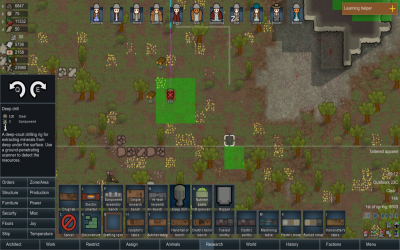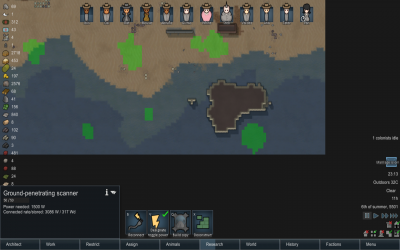Difference between revisions of "Deep drill"
(→Operation: corrected outdated mining-yield information) |
|||
| Line 13: | Line 13: | ||
|flammability = 1 | |flammability = 1 | ||
|power = - 200 | |power = - 200 | ||
| − | | | + | |resource 1 = Steel |
| + | |resource 1 amount = 200 | ||
| + | |resource 2 = Component | ||
| + | |resource 2 amount = 4 | ||
|deconstruct yield = {{icon|metal|150}} + {{icon|component|3}} | |deconstruct yield = {{icon|metal|150}} + {{icon|component|3}} | ||
}} | }} | ||
Revision as of 03:09, 9 January 2021
Deep drill
A deep-crust drilling rig for extracting minerals from deep under the surface. Use a ground-penetrating scanner to detect the resources.
Base Stats
- Type
- Production
- Beauty
- -25
- HP
- 140
- Flammability
- 100%
Building
- Size
- 1 × 1
- Placeable
- Yes
- Power
- - 200 W
Creation
A deep drill extracts resources from underground deposits.These deposits are discovered by constructing a ground-penetrating scanner and connecting it to power. Clicking the scanner reveals all deposits (cells highlighted green) on the map, but does not reveal the exact contents of each deposit. Constructing or clicking any deep drill also displays all deposits, if a scanner is in place and powered. Clicking a drill (powered or unpowered) will reveal exactly which resource is in the deposit at that location.
Placement
When placing a deep drill it can fit in as little as a 1x2 space - one cell for the drill, and one cell for the interaction spot. The outline does not restrict placement in any way. It only shows the drill's extraction zone and it can overlap walls, mountains, water, buildings, and even some of the maps border's exclusion zone but not the second tile away. Most deposits are in open space, but in tight spots, the drill can be rotated (keys: Q\E) to position the interaction spot.
A drill only extracts resources within its extraction zone, so it should be placed to cover as much as possible. Drills can be moved, allowing the drill to be reused once resources are exhausted. If building a drill is blocked by terrain like mud or shallow water, the drill can be installed on a bridge. Resources detected in deep water or deep ocean water beyond the overlap zone cannot be extracted.
Operation
A drill is operated by miners. Unlike crafting stations, the colonist cannot make use of a chair while operating the drill. The drill's inspection pane shows what resource is below (bioferrite, gold, plasteel, silver, steel, uranium, or jade). Cells will turn from green to yellow and then blank as they are depleted. Each cell contains a total of 300 resources, but the actual number obtained depends on the miner's mining yield, so the values may be slightly lower. Drill operation can be suspended by marking the drill as forbidden or turning off its power.
Drills will produce stone chunks if there are no other materials below them. To prevent pawns from continuing to drill stone undesirably, a drill that has exhausted all other resources will automatically be marked "forbidden" with a notification to the player.
Each extraction cycle takes a base of 14,000 ticks (3.89 mins) of work to finish, modified according to the colonist's Mining Speed stat. Although this time is the same for all materials, the amount per cycle varies. For example, plasteel yields 7 units per cycle, making it effectively 5 times slower to mine than steel, which yields 35. This means using deep drills is from over 700 (silver) to almost 3000 (gold/jade) times less efficient than normal mining.
Note that resource fields may be adjacent to each other, sometimes with different types of resources. If a drill is placed such that it overlaps both zones, it will mine all of the resources from one type before switching to the other field. In which case, the infobox will display which resource the drill is currently extracting.
Power
A deep drill requires power to operate. Besides connecting to the main power grid, relocating charged batteries can provide power for a while. This can eliminate running power lines to remote areas, however a roof is needed to protect the batteries from rain. Alternatively, a vanometric power cell works to power up to 3 nearby drills constantly.
Once a drill has completely mined all resources in its zone, it will continue to draw power until it is turned off, disconnected from the grid or deconstructed.
Resources
The resources contained in a deposit correlates with the size of the deposit. Below is an estimate of the different deposit sizes:
| Resource | Deposit Size | Deposit Mean | Commonality | Portion Size |
|---|---|---|---|---|
| 20 - 40 | ~ 30 | 4 | 35 | |
| 7 - 20 | ~ 14 | 0.5 | 40 | |
| 16px Plasteel | 2 - 10 | ~ 7 | 1 | 7 |
| 1 - 5 | ~ 3 | 0.5 | 10 | |
| 4 - 10 | ~ 7 | 1 | 10 |
Note that it is also possible (but uncommon) for deposits to directly touch each other which can make identification harder.
Alternative table:
| Resource | 1-5 | 6-10 | 11-15 | 16-20 | 21-30 | 31-40 |
|---|---|---|---|---|---|---|
| - | - | - | - | |||
| - | - | - | ||||
| - | - | - | - | - | ||
| - | - | - | - | - | ||
| - | - | - | - | |||
| 16px Plasteel | - | - | - | - |
Infestations
Manned drills are capable of drilling into underground insect hives, bringing several to the surface. There will be a short delay between the alert and their appearance, giving your miner time to get away.
Version history
Prior to version B19, Chemfuel could be acquired by drilling.
Starting in 1.0, it's possible to drill into insectoid hives.
In 1.1.2624 the area of deep drills has been expanded to become 21 tiles large (5x5 square minus the corners), as opposed to 9 tiles (3x3 square). Its power consumption has also been reduced (300 -> 200W).


